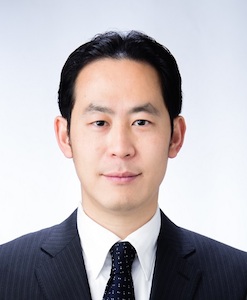 Koji Fukuda, Japan
Koji Fukuda, Japan
Regional Programme Analyst, UN-REDD Programme Africa Unit
United Nations Development Program (UNDP), Nairobi, Kenya
International Development Studies Program (’07)
Please tell us about your career path so far. What is your area of specialization and how did you come to work in this area?
So far I have built my professional career in the area of environment and climate change. I have come to this domain by following my academic background in environmental science and development economics, as well as accumulating work experiences both in theory (policy research) and practice (implementation) through working for a global environmental think tank, a private consulting company and JICA program. Climate change is a broad, intricate yet at the same time interesting field to work in, as this global environmental issue presents one of the greatest challenges of our times, and is heavily linked with sustainable development of developing countries.
How I came to take up the current position requires a bit of background explanation on my motivation to transition from theory to practice. Prior to the current position, I was heavily engaged in the global negotiation process under the United Nations Framework Convention for Climate Change (UNFCCC), the international forum to negotiate and set direction towards how the member states should tackle the issue. I was also undertaking normative policy research around the UNFCCC-related matters.
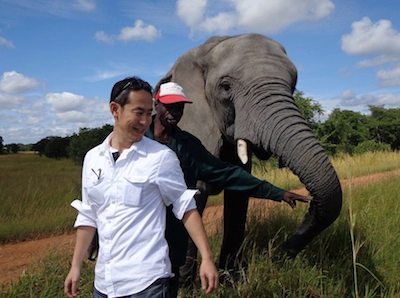
Encountering richness of wildlife in the Miombo Forest, Zambia – reminds me of the importance of considering benefits beyond carbon for any climate change interventions.
Being engaged in this process, including technical/thematic discussions, drafting of decision texts, and understanding of the complexity of multilateral decision making process (e.g. political and diplomatic efforts to reach a global consensus by reconciling conflicting country positions) all helped me nurture in-depth knowledge around the issue, principles, key stakeholders, mixed interests, and dynamics of the game. Yet, I also observed the process has an inherent risk of turning into a talk show if the practical perspective is not properly put in place. I became more interested in the practical side – how to apply upstream global decisions to developing countries on the ground, while addressing developmental needs.
In short, I was more inclined towards engaging in the activities to support developing countries gearing towards a low-carbon, climate resilient development pathway, by supporting countries to translate the upstream decisions into actual domestic policy and measures according to national circumstances to facilitate delivery of outcomes anticipated by the countries. My aspiration to support this vertical linkage (decision-policy and measures-implementation) triggered me to transition to more tangible, down-to-earth and implementation-oriented process, in which UNDP has a comparative advantage.
You are currently working as Program Analyst at UN-REDD/Africa. Please tell us about UN-REDD and your main responsibilities and duties.
The UN-REDD Programme is the United Nations collaborative initiative on Reducing Emissions from Deforestation and Forest Degradation (REDD+) in developing countries. The concept of REDD+ has been anchored in the future climate regime under the UNFCCC since the COP13 Bali Conference in 2007. In essence, the Programme deals with climate change mitigation (reducing Greenhouse Gases) by tapping on the forestry sector, which accounts for approximately 20% of the total global CO2 emissions.
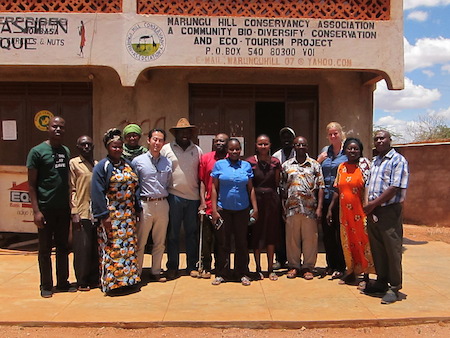
Field visit complements our policy work by facilitating better understanding of opportunities and challenges on the ground.
The Programme builds on the convening role and technical expertise of the 3 UN organizations – Food and Agricultural Organizations (FAO), United Nations Development Programme (UNDP), and United Nations Environmental Programme (UNEP), and serves as an epitome of the UN “Deliver-as-One” principle, under which different UN agencies work together to achieve common objectives. Currently, the UN-REDD Programme has a budget of around $218 million (as of April 2014), and covers three different regions of the world; Latin America, Asia-Pacific, and Africa. The Programme supports national REDD+ readiness efforts of partner developing countries in two ways: (i) direct support to the design and implementation of UN-REDD National Programmes; and (ii) complementary support to national REDD+ action through common approaches, analyses, methodologies, tools, data and best practices developed through the UN-REDD Global Programme.
The UN-REDD Programme also works in close partnership with other REDD+ initiatives, especially those operated by the World Bank (Forest Carbon Partnership Facility (FCPF)), and supports the implementation of UNFCCC decisions. As a multilateral, country demand-driven initiative, the Programme has a critical role to play both, to support the emerging interim arrangements for REDD+ financing and coordination, and to support the incorporation of an effective REDD+ mechanism within a post-2012 climate change agreement.
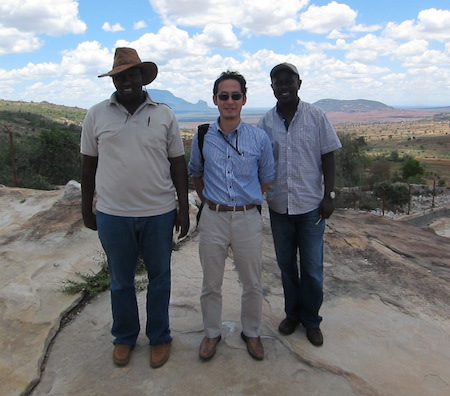
Overviewing Kasigau Corridor landscape, Voi, Kenya.
As far as my role is concerned, here at Nairobi, I belong to the UNDP/UN-REDD Africa Regional Unit overseeing the country portfolio across the region. As a regional Programme Analyst, I assume dual functions; 1) to support design and implementation of country support programs, and 2) to advance analytical works around REDD+ to collate, analyze and disseminate lessons and best practices. For the former, I am mainly engaged in advancing support programs in the Anglophone partner countries in the region (e.g. Zambia, Tanzania, Kenya, Ethiopia, Nigeria, Malawi etc.) whereas my senior colleagues also oversee the Francophone countries, with emphasis on the Congo-Basin countries. For the latter function, I am mainly working on REDD+ readiness assessment (design and test a methodology to gauge national readiness towards REDD+ implementation), policy guidance on national REDD+ strategy development (depicting building blocks and essential steps to develop national strategy), and design of implementation framework (how to design and build REDD+ registry as an integrated information system to support national REDD+ process).
What are some of the biggest challenges you face in your work? And what have been the most interesting or rewarding aspects of your career thus far?
I would say I am facing two-folded challenges; the region and the language. For the former, I was new to the region with limited background knowledge when I assumed my post in Nairobi last year, as most of my previous work experiences lie within the Asia-Pacific and the UNFCCC setting. Inception to the region – identifying and understanding the regional contexts, different country dynamics for our partner countries and key domestic players – took me a considerable amount of time before being able to fully engage in the operational support. For the latter, the mixture of Anglophone and Francophone developing countries in our regional portfolio requires language proficiency in both languages for the roles expected. While my focus is on the Anglophone countries, this remains to be a challenge yet to overcome.
The most rewarding aspect of my career is the bigger opportunity attached to the challenges I face. Gaining work experiences in a new region, particularly in a multilateral setting, certainly helps broaden my perspective and helps my career and experiences to become genuinely global, which altogether expand my capacity and flexibility to deliver outcomes in different country settings. Exposure to new countries is also a fascinating aspect of my work, facilitating my understanding of the diversity of the world that we live in.
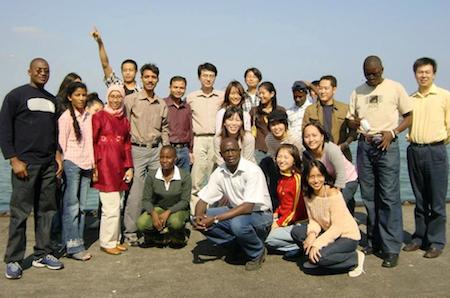
With fellow students at a field trip.
What led you to GRIPS? What is the most important thing you got out of your studies here, and how has your experience at GRIPS prepared you for future endeavors.
Consideration of GRIPS for pursuing my graduate studies started with the fact that establishing a professional career in the field of international development requires at least a master’s degree at its entry level. Out of the different possible options considered and offered, the GRIPS/IDS Program stood out for its package which I found very practical and attractive; 1) teaching/coaching of development economics and its applications by top researchers, 2) hands-on internship experience at international organizations during the course program, and 3) the financial scholarship attached to the program. Having returned from the two-year development work at the Republic of Marshall Islands, the learning at GRIPS offered me an ideal setting to transition and link practical experiences with theory, as well as helped maintaining and nurturing my aspiration for pursuing my career in the field of international development.
Perhaps the most useful element I’ve got out of GRIPS is overall confidence that I have nurtured through intensive academic work. Meeting the course requirements under the competitive environment in the IDS Program provided me sufficient pressure to push myself to work hard until late at night, and it was not an easy task. Yet, this has set a reference level thereafter – I still feel the level of intensity I’ve gone through during the GRIPS time is greater than the working environment I have experienced thereafter. This confidence nurtured throughout GRIPS time is something I consider as a great asset to date.
What is your fondest memory of your time spent at GRIPS?
I recall I cherished moments of social interactions with my international classmates. Beyond our common endeavors (and sufferings) to overcome the course requirements on a daily basis, I enjoyed socialization part as well – beers, cheering for the cross-national cricket tournaments, engaging some of the classmates who had never seen the actual snow before into snow fight, etc. Now that all of my classmates are scattered across the globe, I continue cherishing the good old days at GRIPS with former classmates at reunions in different countries.
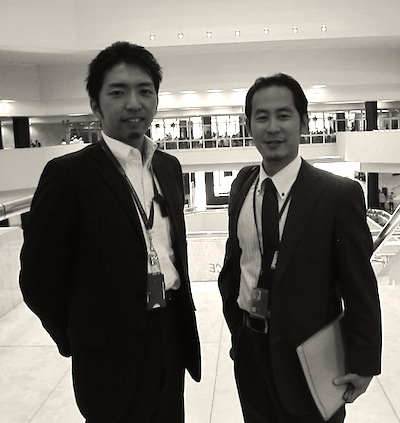
Presenting at the Third Conference on Climate Change and Development in Africa in Addis Ababa, Ethiopia –also to learn from continental aspiration to tackle climate change.
You have been living outside Japan for some time now. What do you miss about Japan and what do you like about living in Kenya?
I don’t always have the luxury of having access to genuine Japanese food or having many choices for international cuisines. Sometimes I miss food from my home country, but nowadays I am more adapted to local conditions – take whatever I can find locally, enjoy and be happy.
Being based in Nairobi is certainly an eye-opening experience. Aside from exposure to richness of nature and wildlife, I feel privileged to witness both the positive transformation and the struggle that both Kenya and East Africa region as a whole encounter in their development processes. On the one hand, the rise of a roaring middle class with a strong appetite for consumption, market expansion and infrastructure development. Yet, on the other hand the widening income gap, natural capital exploitation and degradation, poverty connected to extremist ideology and social unrest. Altogether this presents the reality on the ground. Perhaps some of the issues will require decades to overcome, but I do enjoy thinking about how the support work that we provide could possibly make a difference; how we can contribute to make these countries more effective in responding to the needs and to amplify positive transformations in such a complex, dynamic settings.
What is your favorite thing to do when you are not working?
In my spare time I regularly go to a recreation center to workout, and play sports to stay healthy.
How do you maintain a balance between your work and the rest of your life?
I find it rather easier to strike a work-life balance in Nairobi than back in Japan, partly because of a different attitude towards work. It is easier to secure personal time by leaving the office after regular working hours in Nairobi (which is common practice), enabling me to depart from an old working habit of staying office overtime until late hours.
To a certain extent, my work-life balance is automatically maintained as the line between work and life is blurry – I enjoy the nature of the work I am undertaking, including practical discussions among stakeholders, missions to other countries, exposure to new experiences etc.
If you could give one piece of advice to anyone considering studying at GRIPS what would it be?
One of the comparative advantages of GRIPS is its focus on empirical research. Moreover, the fact that most of the students enrolled join GRIPS with work experience and their more solution-oriented mindset provides a unique academic environment. For those who consider applying to GRIPS, perhaps it is useful to start off by thinking through how your previous experiences and academic motivations best suit this unique academic environment, and how you wish to utilize the knowledge you obtain towards your future career development (the vision setting and the roadmap).
How would you like to maintain involved with the School? What do you expect from GRIPS as an alumnus?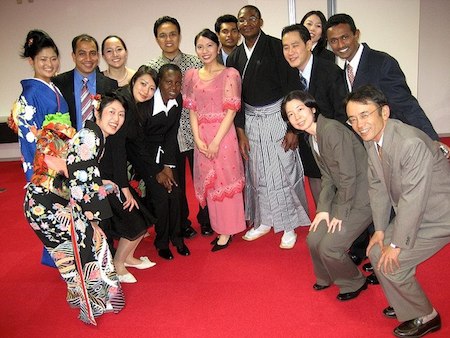
I am happy to stay engaged in GRIPS in any form.
For the request, receiving invitations for public GRIPS lecture series and eminent persons’ presentation at Sokairo Hall is certainly very useful – but perhaps this benefit can be widely shared among the alumni living outside Japan if the contents can be broadcasted or made available online (access could be limited to alumni).
Do you have any suggestions on how to further utilize the GRIPS alumni network?
Harnessing the collective wisdom of the GRIPS alumni, it would be interesting if GRIPS could regularly pick development and policy-related hot topics of selected developing countries, and invites short articles or commentaries from in-country alumni. Harnessing the alumni network to facilitate interactive, quality discussion might also be an interesting exercise.





